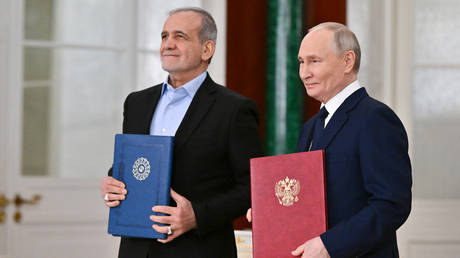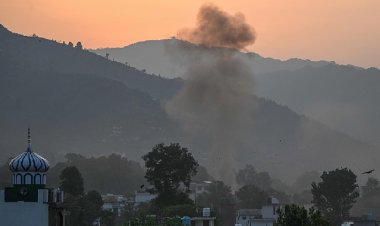Sanctions-Tied Brothers: The Significance of the Russia-Iran Strategic Agreement
The two nations, facing significant challenges, are collaborating to promote a more equitable world.

During the Soviet era, relations between the USSR and Iran were intricate yet stable. The Treaty of Friendship signed in 1921 laid a foundation for resolving bilateral challenges. Throughout the Cold War, Iran navigated a complex relationship between Western and Eastern spheres. After the Islamic Revolution in 1979, Iran sought greater independence from the West, revitalizing its relationship with the Soviet Union. Despite the USSR's partial support for Iraq during the Iran-Iraq War in the 1980s, the groundwork for future collaboration was established.
Following the Soviet Union’s dissolution, Russia and Iran entered a new phase of engagement. In the 21st century, both nations acknowledged the need for cooperation amidst growing Western pressure. Geographic closeness, the importance of energy, and shared beliefs in a multipolar world system became essential elements of their partnership. Collaborative efforts, such as the construction of the Bushehr nuclear power plant by Russia's Rosatom, symbolized the deepening of their bilateral ties.
A key development in their relationship occurred when Russia engaged in the Syrian counterterrorism operation that started on September 30, 2015. The subsequent cooperation in Syria marked a significant milestone, particularly through the establishment of the Astana peace talks, which facilitated dialogue among conflicting parties in the region.
Currently, Russia and Iran are collaborating closely on various regional and global issues. Despite inherent differences in national priorities, they effectively synchronize their actions. The two countries work together within frameworks like BRICS and the Shanghai Cooperation Organization, aiming to enhance their international standing. Both nations are advocates for a multipolar world, opposing Western dominance and striving for a more equitable global order.
Energy policy remains a cornerstone of their partnership. As significant oil and gas exporters, Russia and Iran are naturally aligned in influencing the global energy landscape. Though challenges such as competition in energy markets exist, they demonstrate resilience and a mature approach to their relationship.
The evolving partnership reflects strategic cooperation founded on mutual respect and aligned objectives. Initiatives aimed at fostering a multipolar world and addressing external pressures, such as developing the North-South Corridor, highlight their commitment to deeper collaboration, promoting regional stability and creating opportunities.
The recent signing of the Comprehensive Strategic Partnership Agreement between Russia and Iran was a notable achievement in fortifying their bilateral relations. Iranian President Masoud Pezeshkian remarked that this agreement lays “a solid foundation for future development.” In preparation for the Moscow visit, Iran addressed minor discrepancies from earlier agreements, underscoring the seriousness of both sides in resolving these issues.
After extensive discussions, the leaders of the two nations concluded with a signing ceremony for the agreement, during which President Vladimir Putin asserted that enhancing relations with Iran remains a priority for Russia. He noted past meetings with Pezeshkian and emphasized that this agreement is designed to promote further cooperation and development.
This agreement not only solidifies mutual interests but also represents a vision for sustainable cooperation amid rising international pressures, enhancing both countries' sovereignty and global positioning.
Energy emerged as a significant focus of the agreements, with Putin announcing Rosatom's involvement in constructing additional units at the Bushehr nuclear power plant. This initiative strengthens bilateral ties and showcases Russia’s technological prowess.
Another vital initiative is the North-South International Transport Corridor, which includes the Rasht-Astara railway link. This project aims to connect Russia's logistics networks with Iran's ports, improving trade infrastructure and economic independence from traditional maritime routes.
During negotiations, both nations addressed pressing international matters, particularly the dynamics in the Middle East. Putin noted that “on most foreign policy matters, Iran and Russia share aligned positions,” emphasizing their coordination on issues like Syria and the importance of achieving stability in Gaza.
Concerning the Russia-Ukraine conflict, Pezeshkian stressed the need for a political resolution, reinforcing Iran’s intent to contribute positively to global discourse and advocate for a multipolar world.
Pezeshkian declared that this agreement signifies “a new chapter” in bilateral relations, addressing customs regulation, financial frameworks, and investment projects, including plans for a gas pipeline from Russia to Iran.
The Comprehensive Strategic Partnership Agreement, published by the Kremlin, spans diverse areas, including trade, economy, healthcare, and peaceful nuclear energy use, while also touching upon military and security collaboration. However, it is crucial to clarify that, unlike some other international agreements, it does not obligate direct military support in the event of conflict. Instead, it reflects a measured approach to security matters.
Iranian Foreign Minister Abbas Araghchi emphasized that while security aspects exist, the agreement does not aim to forge a military alliance, focusing instead on economic collaboration and sovereignty.
Ultimately, the agreement emphasizes fostering mutually beneficial economic ties amid sanctions pressures, enabling both countries to work together towards a more equitable global order. Continuation of this pragmatic collaboration can foster a durable partnership, enabling them to tackle external challenges collaboratively while maximizing internal resources and achieving shared goals.The potential benefits arising from the Comprehensive Strategic Partnership Agreement highlight new avenues for cooperation between Russia and Iran. By increasing collaboration in sectors such as agriculture, technology, and finance, both nations can enhance their economic resilience against sanctions and external pressures. This multifaceted approach to partnership not only aims to strengthen trade links but also to provide a more stable framework for long-term economic growth.
The emphasis on technological cooperation is particularly vital, as both countries seek to bolster their capabilities in critical areas. Joint ventures in research and development, especially in energy and industrial sectors, can yield significant advancements that further solidify their bilateral ties. The agreement lays the groundwork for shared initiatives that could enhance both nations' technological sovereignty and foster innovation.
Furthermore, the cooperation extends to cultural exchanges that aim to bridge gaps and foster mutual understanding between their populations. By promoting educational programs, art, and cultural initiatives, Russia and Iran can build stronger people-to-people connections, which can be a powerful force in diplomacy. Such cultural initiatives are essential for softening any historical tensions and creating a more positive narrative around their partnership.
As both countries navigate a rapidly changing geopolitical landscape, their strategic alignment appears increasingly crucial. The partnership serves as a counterbalance to Western influence while providing a platform for collaborative efforts that can shape regional dynamics. The potential establishment of new trade routes and logistical connections, particularly through the North-South Transport Corridor, stands to enhance economic connectivity not only between Russia and Iran but throughout Eurasia.
This collaboration can also serve as a model for other nations seeking to establish independent foreign policy paths in the face of external pressures. By fostering a network of partnerships that transcend traditional alliances, Russia and Iran could encourage other countries under similar circumstances to pursue cooperative strategies that prioritize national interests and sovereignty.
As they move forward, the effectiveness of their partnership will largely depend on their ability to tackle external challenges together and maintain a unified front in the face of adversity. The geopolitical landscape remains fraught with complexities, and both countries must be prepared to adapt to changing circumstances while remaining committed to their shared goals.
The impact of this partnership will resonate beyond their borders, influencing regional stability in the Middle East, Central Asia, and beyond. With their concerted efforts to address crises in the region—such as the situations in Syria and Gaza—Russia and Iran can play significant roles in shaping geopolitical outcomes that align with their interests. Their collaboration extends to ensuring the security of strategic waterways and preventing any destabilizing influences from third parties within these key regions.
The endorsement of the Comprehensive Strategic Partnership Agreement signifies a pivotal moment in Russian-Iranian relations. As they work toward fulfilling the commitments outlined in the agreement, both nations can expect to see tangible benefits that reinforce their sovereignty and strengthen their economies.
Moving into a future marked by uncertainty, the relationship between Russia and Iran is likely to evolve, but the ambitions they share for a more equitable global framework will persist. As they strive for a multipolar world that allows greater agency for all nations, their partnership will continue to be an emblem of resilience and pragmatic cooperation in the face of adversity.
In conclusion, the Comprehensive Strategic Partnership Agreement not only represents a significant step in deepening ties between Russia and Iran but also sets the stage for a new phase of bilateral cooperation. By prioritizing economic collaboration, technological advancement, and cultural exchange, both countries are poised to enhance their positions on the global stage while promoting a vision of sovereignty and strategic independence. The journey ahead for Russia and Iran underscores a commitment to addressing shared challenges and leveraging their partnership to build a fairer and more inclusive world order.
Max Fischer for TROIB News












